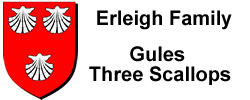==The Erleigh / Earle Family Surname==
Pronounced: ER-LAY or ER-LEE
”’The Erleigh Lands in Berkshire
”’
The Erleigh family derived their surname as a land “place name” from an estate called Erleigh in the parish of Sonning, Berkshire, England. Feudal Aids, Berkshire, p.47,56,70 The land was granted to the family by Henry I between 1100- 1135. There were two existing manors on the estate, which were called ”’Erleigh St. Nicholas”, also known as Erleigh Regis and later called Erleigh Whiteknights, and ”’Erleigh St. Bartholomew” which was later called Erleigh Court.
A third manor called ”’Maiden Erleigh” was formed later out of Erleigh St Nicholas as a gift of land by John de Erleigh to Robert de Erleigh in 1362.
According to the Domesday Survey of 1086, the manor Erleigh St. Nicholas, also known as Erleigh Regis and later called Erleigh Whiteknights, was held before 1066 by Almar (a SAXON) in alod (Freehold) of King Edward the Confessor, and at the time of the Survey (1086), was part of the royal demesne (holding). It was assessed at four hides which means there was enough land for four households.
There is an interesting story about how the names “Erleigh Whiteknights” and “Maiden Erleigh” came about. https://earlefamilyhistory.com/the-manor-of-maiden-erleigh-earley/
In addition to the manors, there was also a Catholic Convent on the land, but it isn’t recorded in the Domesday survey. (see: https://www.british-history.ac.uk/vch/berks/vol2/pp73-77).
The land called Erleigh (Earley) with these two manors existed before the Norman conquest (1066 AD). It is not known when exactly the manors were built or how long these lands had been occupied by the family. The Domesday Survey of 1086 records the name of the land as “Herlei” and “Erlei”. The Domesday Book spelling is the Latin spelling. The Erleigh land still exists and is the modern-day town of Earley Berkshire.
”’Modern Day Earley:”’ https://goo.gl/maps/b4kLyz2MbgxKmv3D7
The family surname, which was originally spelled Erleigh, was changed to “de Erleigh” during the time of the Norman Kings. The “de” is a French nomenclature indicating “from” so de Erleigh means “from Erleigh.” The surname appears in historical records as de Erleia, de Earley, de Erley, d’Erley, de Herlegh, Earley, Erlee, de Arle, Arley, etc.
Many hundreds of place names have Ley or Leigh within them – which is Anglo-Saxon for wood or clearing. In Berkshire, this would apply to both Earley and Woodley.
”’The Lands in Berkshire
”’
The family holdings in Berkshire included, at various times, the manors of Erley Regis (Whitenights) and Maiden Erley in the hundred of Sonning, the manors of Charlton, South Denchworth, and Cleets in the hundred of Wantage, the manor of Midgham in the hundred of Reading and the manor of Barkham in the hundred of Charlton. In the Doomsday Book of 1086, the manor of Erley (Herlei) is assessed at 4 hides Domesday Book Entry shown in the National Archives Website. https://www.nationalarchives.gov.uk/domesday/discover-domesday/interpreting-domesday.htm.
”’The Lands in Sommerset
”’
While they took their surname from Erleigh in Berkshire, the family also held considerable property in the County of Somerset, which was their original principal residence. These possessions included the county manors of Beckington, Durston, Babcary, Michael’s Church, the manor and hundred of North Petherton, and the manor of Somerton (also referred to as Somerton-Parva and Somerton-Erleigh). History and antiquity of the county of Somerset” by Rev. John Collison (first 3 volumes),v.2,p.198. The Family holdings were enough that the Family was considered to be minor Barons.
”’The First of His Name
”’
The surname of this family of knightly rank stems from John de Erleigh, who first appears in records as a knight in the Reign of Henry II (5 March 1133 – 6 July 1189 ). John de Erleigh was the first in recorded history to use this surname. He was most likely the first son born on these lands after they were granted to the family by King Henry I so it would make sense that he would be John de (de means “of”) Erleigh.
The first record that John de Erlegh exists is found in the seventh year of Henry II (1161). He paid five marks for the scutage of his lands at Beckington, Somerset, and at that time, he also held the manor and hundred of North Petherton.
John de Erlegh then died in 1165, and in the same year, his widow, Adela, again paid 5 marks scutage. He was succeeded by his son William de Erlegh.
(Under feudalism, the king, through his vassals, provided land to knights for their support. The knights owed the king military service in return. Scutage is a medieval English tax levied on holders of a knight’s fee under the feudal land tenure of knight service. The Scutage tax was paid when you were unable to respond or serve when the King called.)
The Erleigh family lines quickly expanded through many counties, from Somerset to Wiltshire and Devon, from Devon to Dorset, and from Dorset to Essex.
From John de Erlegh (d. 1165), we have in the “line of succession” or inheritance following the firstborn sons ten successive generations of males in Somerset and Berkshire, then at the eleventh generation, we have no male heir and only a daughter named Margaret de Erleigh who inherits all the lands. From there, we have many branches spread throughout England.
”’Earle, Earles, Erle, Erles
”’
Over time the surname name has morphed in both England and America to Earle, Erle, Earl, Earll, Earls, Earles, Earley, and possibly Hurley, Searly and Darley, Dearly.
